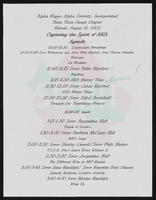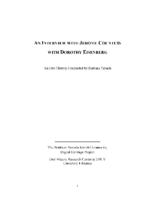Search the Special Collections and Archives Portal
Search Results

Transcript of interview with Rita Deanin Abbey by Claytee White, November 29, 2014 and February 26, 2015
Date
Archival Collection
Description
Rita Deanin Abbey is an Emeritus Professor of Art at the University of Nevada, Las Vegas. She taught drawing, painting, and color theory and innovated interdisciplinary courses with the sciences at UNLV from 1965 to 1987. The University of Nevada, Las Vegas, Marjorie Barrick Museum and the Palm Springs Desert Museum (presently Palm Springs Art Museum), Palm Springs, CA collaborated to present the Rita Deanin Abbey 35 Year Retrospective, which was held February 16-March 5,1988 at UNLV and March 25-June 5,1988 at the Palm Springs Art Museum. Abbey received her Bachelor of Fine Arts degree in 1952 and her Master of Arts degree in 1954 from the University of New Mexico, Albuquerque, NM. She also studied at Goddard College, Plainfield, VT; the Art Student s League, Woodstock, NY; the Fians Hofmann School of Fine Arts, Provincetown, MA; and the San Francisco Art Institute, San Francisco, CA. She was an artist in residence in the studios of Toshi Yoshida, Tokyo, Japan, John Killmaster, Boise, ID; Methow Iron Works, Twisp, WA; Tamarind Institute, University of New Mexico, Albuquerque, NM; the Mason Gross School of the Arts, Rutgers, The State University of New Jersey, New Brunswick, NJ; Shidoni Foundry, Tesuque, NM; Bill Weaver Studio, Chupadero, NM; Savoy Studios, Portland, OR; and Carlson & Co., San Fernando, CA. Abbey, who works in the areas of painting, drawing, printmaking, sculpture, porcelain enamel fired on steel, stained-glass, and computer art, has had 60 individual exhibitions and has participated in over 200 national and international group exhibitions. She is represented in private and public collections in the United States, the Middle East, Europe, and South America. Abbey has published several articles in journals, and six books: Rivertrip, Northland Press, Flagstaff, AZ, 1977; Art and Geology: Expressive Aspects of the Desert, Peregrine Smith Books, Layton, UT, 1986 (co-authored by G. William Fiero); the Rita Deanin Abbey Rio Grande Series, Gan Or, Las Vegas, NV, 1996; In Praise of Bristlecone Pines, The Artists' Press, Johannesburg (presently located in White River), South Africa, 2000; Isaiah Stained- Glass Windows, Gan Or, Las Vegas, NV, 2002; Seeds Yet Ever Secret, Poems and Images, Gan Or, Las Vegas, NV, 2013. She has been the recipient of many commissions and grants and has won several awards, including the Bicentennial Commission for the State of Nevada, 1976; the Governor's Seventh Annual Visual Arts Award for the State of Nevada, 1986; and the Chairman's Award of Excellence at the 1987 International Exhibition of Enamelling Art, Ueno Royal Museum, Tokyo, Japan. From 1988-1990, Abbey fabricated Northwind, a steel sculpture (17ft. x 27 ft. 5 in. x 25 ft. 10 in., 7 tons), installed in Las Vegas, NV. Abbey was invited by the Gallery Association of New York State to exhibit four of her works in its 1989-1991 traveling exhibition, Color and Image: Recent American Enamels. In 1992, the Markus Galleries, Las Vegas, NV, and the Nevada Symphony presented an exhibition of art by Abbey, which inspired Virko Baley s Piano Concerto No. 1. The world premiere performance of the concerto was held in 1993 at the National Opera House, Kiev, Ukraine. In 1993, Abbey constructed Spirit Tower, a cor-ten steel sculpture (20 ft., 11 tons), which was commissioned by the Las Vegas-Clark County Library District for the Summerlin Library and Performing Arts Center. Abbey was invited by the Pacific Division of the American Association for the Advancement of Science to lecture on Art and Geology at San Francisco State University for the 75th Annual Meeting, on June 19-24,1994. She was one of three artists from the United States invited to participate in the exhibition, Enamel Today, at Villa am Aabach, Uster, Switzerland, June-July, 1995. Additionally in 1995, Abbey completed a series of cast bronze sculptures at Shidoni Foundry, Tesuque, New Mexico. Commissioned in 1998, Abbey completed the Isaiah Stained-Glass Windows in 2000, sixteen 10 ft. x 2 ft. stained-glass windows for the main sanctuary of Temple Beth Sholom, Las Vegas, NV. Also in 2000, she completed Holocaust, a stainless steel sculpture (14 ft. 3 in., 4.5 tons), installed in Las Vegas, NV. In 2003 her bronze sculpture, Ner Tamid, was installed in Temple Adat Ami, Las Vegas, NV. Snakewash, a cor-ten steel ground sculpture (62 ft.), was completed in November 2003. Abbey fabricated steel sculptures and cast small and large bronzes from 2004 through the present. In 2006 she completed and installed Guardian of All Directions, a stainless steel sculpture (14 ft., 1.5 tons). The Guggenheim Hermitage Museum and Young Collectors Council visited the studio and home of Rita Deanin Abbey, Las Vegas, Nevada October 15, 2006. During March 2008, Women's History Month, Abbey was recognized for her contributions to the Arts by Mayor Goodman and Members of the Las Vegas City Council. Hidden Pass, a 2-inch steel plate sculpture (16 x 28 ft. 8 in. x 13 ft., 22 tons), was installed in 2010. Between July 16-December 23, 2011, Abbey exhibited in Blast from the Past, '60s & '70s Geometric Abstraction at Palm Springs Art Museum, Palm Springs, California. The City of Las Vegas Office of Cultural Affairs, Las Vegas Arts Commission presented Abbey the Lifetime Achievement Award for Excellence in the Arts on May 25, 2012. Balanced Arc, an outdoor bronze sculpture (8ft. 8 in. x 9 ft. x 7 ft. 4 in., 1600 lbs.), completed in 2012, was installed in April 2013. The Western Museums Association 2014 Annual Meeting in Las Vegas, NV, toured The Art of Rita Deanin Abbey at the Desert Space Museum October 5, 2014. Abbey participated in the fall group exhibition Macrocosm/Microcosm: Abstract Expressionism in the American Southwest at the Fred Jones Jr. Museum of Art, University of Oklahoma, Norman, Oklahoma, October 2, 2014-January 4, 2015. Her artwork was also shown in the Recent Acquisitions exhibition at the Marjorie Barrick Museum, University of Nevada, Las Vegas, June 19-September 19, 2015. Currently, Abbey is working on new sculptures, paintings, and enamels. vii
Text

Transcript of interview with Laura Kelly by Cindy Gaylor, February 27, 1979
Date
Archival Collection
Description
On February 27, 1979, Cindy Gaylor interviewed engineering aid accountant, Laura Kelly (born December 31st, 1928 in Silverton, Colorado) in her home in Boulder City, Nevada. The two discuss Kelly’s reasons for moving, as well as her early life in Boulder City. They also discuss Nellis Air Force Base, as well as local politics. The interview concludes with a discussion of the Civilian Conservation Corps (CCC) in Southern Nevada, during the Great Depression.
Text

Transcript of interview with James Bonnell by Gerald L. Conner, February 22, 1977
Date
Archival Collection
Description
On February 22, 1977, James Bonnell interviewed Gerald L. Connor (born 1930 in Boston, Massachusetts) about his experiences in Nevada and his work in education. Connor first talks about his move to Nevada while he was a member of the United States Air Force. He then discusses his education, including that at the University of Nevada, Las Vegas, and also describes his church membership. Connor later talks about changes in the schools and school district, the growth of gambling and properties located in Downtown Las Vegas and the Las Vegas Strip, and the early atomic tests at the Nevada Test Site. He also describes in detail his political activity and involvement with the Democratic Party, including his work with candidates for the offices of Nevada Governor and United States Senator. Towards the end of the interview, Connor talks about events such as Helldorado, the growth of the city over time, and his thoughts on the future of Las Vegas.
Text

Transcript of interview of Thalia Dondero by Mary Germain, March 13, 1976
Date
Archival Collection
Description
On March 13, 1976, Mary Germain interviewed Thalia Dondero (born 1921 in Greeley, Colorado) about her life in Nevada and her experiences as the first female commissioner for the Clark County Commission. Dondero first talks about her upbringing and her eventual move to Southern Nevada. She also discusses her involvement in extracurricular activities, such as being a leader for the Girl Scouts, and how some of those experiences led her to get involved in politics. Dondero also mentions her work with National Geographic and her passion for working with oil paintings and watercolors. The final part of the interview involves some of Dondero’s accounts as a commissioner for Clark County and some of the challenges she has faced in that position.
Text

Transcript of interview with Melody Stein by Barbara Tabach, August 16, 2016
Date
Archival Collection
Description
In this interview, Stein lovingly describes various forms and mediums of art, especially rubber stamping, which included starting and managing a related craft publication, National Stampagraphic, as well as working with polymer clay. She talks about her involvement with the local Polymer Clay Guild, of which she is president, and their various projects, including Bottles of Hope and Hearts for Heroes. Stein also discusses her teaching career at the Hebrew Academy and Adelson Educational Campus.
Text

Transcript of interview with Flora Hannig-Kellar by Michael Taylor, March 27, 1981
Date
Archival Collection
Description
On March 27th, 1981, collector Michael D. Taylor interviewed housewife Flora Hannig-Kellar (born January 24th, 1902 in Washington, Utah) in Henderson, Nevada. This interview is Flora Hannig-Kellar’s personal account on growing up in Nevada. She discusses home and family life and local social and recreational activities. During the interview Mrs. Hannig-Kellar also shares some of the poetry she wrote about Nevada and her family, specifically her children and grandchildren.
Text

Alpha Kappa Alpha Sorority, Theta Theta Omega Chapter retreat and workshop documents
Date
Archival Collection
Description
From the Alpha Kappa Alpha Sorority, Incorporated, Theta Theta Omega Chapter Records (MS-01014) -- Chapter records file.
Text

Transcript of interview with Jerome Countess and Dorothy Eisenberg by Barbara Tabach, October 28, 2014
Date
Archival Collection
Description
Interview with Jerry Countess and Dorothy Eisenberg by Barbara Tabach on October 28, 2014. Countess discusses his childhood and military life. He became involved in the United Jewish Appeal in Las Vegas and started the Jewish Reporter newspaper. Dorothy Eisenberg is also involved in the interview to discuss the Jewish Federation and the Jewish community.
Jerome Countess, known as Jerry to most, was born on December 22, 1920 in Brooklyn, New York. He grew up in the borough's Jewish neighborhood, and he developed a reputation for being a skillful handball player and a great dancer. Though he was not allowed to enlist in the U.S. Coast Guard due to colorblindness, Jerry was eventually drafted into the army during World War II. With very minimal combat training, Jerry was sent to North Africa as an infantryman, and was later stationed in Italy. After three years of service, Jerry returned home and married his childhood sweetheart, Rachel, in 1945. Using the G.I. Bill, he enrolled at New York University to study writing, though he quit just shy of graduation as his wife was expecting. After briefly working in the television broadcasting industry, Jerry landed a job with the United Jewish Appeal. In 1975, following in his desire to move west, Jerry took the job of executive director of the Combined Jewish Appeal in Las Vegas, what would soon be renamed the Jewish Federation of Las Vegas. Under his leadership, the federation started the Jewish Family Service as well as The Jewish Reporter, a monthly publication to promote engagement of the Jewish community. Jerry served as the executive director of the federation for many years, serving at the pleasure of many board members and presidents, including the first female federation president, Dorothy Eisenberg.
Text


